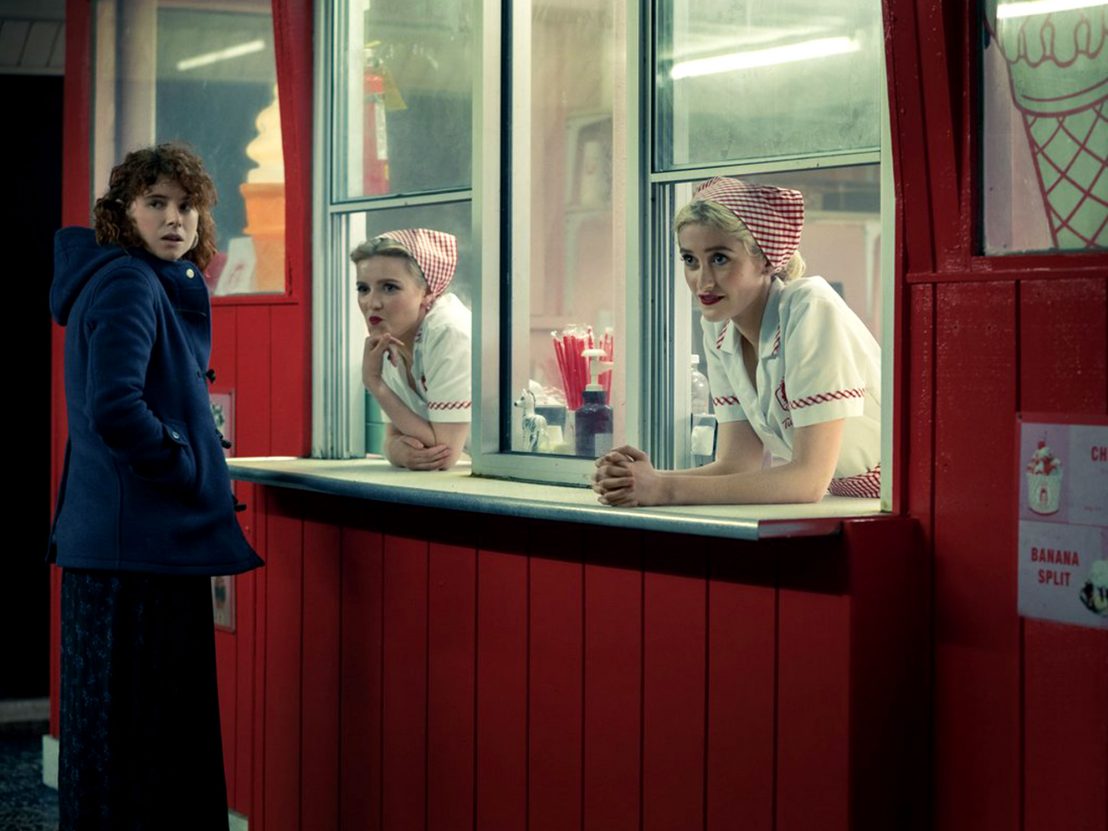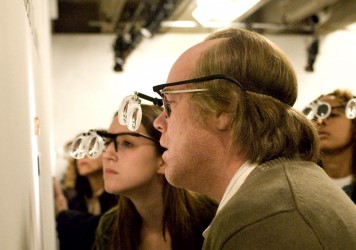
Charlie Kaufman doesn’t eat fast food. But he does dream about it – there’s an oneiric quality to the 24-hour diner lit up in neon along the road at night. Kaufman’s latest film, I’m Thinking of Ending Things, is about dreams. Its structure mirrors Rogers and Hammerstein’s musical Oklahoma!, the first to feature a dream ballet. The dance is replicated in the film as an unnamed young woman (Jessie Buckley) battles with her feelings for Jake (Jesse Plemons) on the eve of meeting his parents. It’s a nightmare all new couples experience, which we fear even though we know it’ll never be that bad.
Sociologist George Ritzer observed in 1993 that our society has come to resemble a network of fast food chains in a process he termed ‘McDonaldization’. These global businesses operate on a subliminal level, conditioning us to associate them with American values and uniform quality. They offer the pleasure of predictability. When Jake pulls in at a Tulsey Town, a road-side fast food outlet based on the Dairy Queen in Iain Reed’s source novel, he can already taste the ice cream.
The scene’s absurdity is heightened by the fact Jake’s sudden craving kicks in during a blizzard. Why does Jake feel so compelled to eat an ice ‘Brr’ that he delays their treacherous journey? A jingle pops into his head about the clown from Tulsey Town where ‘ice cream grows on trees.’ Fast food culture has entered his subconscious and dictates his actions. Jake doesn’t want an Oreo Brr. He needs it.
In Kaufman’s debut novel, ‘Antkind’, published shortly before the release of I’m Thinking of Ending Things, film critic B Rosenberger Rosenberg undergoes a similar ritual. There are bugs on his window, so he pulls into a Slammy’s to get some paper towels. The server tells him she’ll only give him towels with a minimum $5 purchase. He buys a ‘Biggy’ Cola and a burger he doesn’t want. By the end of the novel Slammy’s has (at least in B’s imagination) taken over the United States under President Donald Trunk and broadcasts its adverts directly into the brain.
Kaufman is fascinated by mental manipulation. His second screenplay, Human Nature, applies BF Skinner’s operant conditioning to a primitive man called Puff (Rhys Ifans). Dr Bronfman (Tim Robbins) trains Puff to order at ‘breastaurant’ Chester’s without dry-humping the waitress. Kaufman highlights the fine line the fast food model draws between hired women and the processed meat they serve in the customer’s gaze – the Chester’s uniform depicts a burger over each breast. McDonaldization holds up patriarchy, positioning men as consumers and women as sexual products.
As Walter Benjamin observes in ‘The Work of Art in the Age of Mechanical Reproduction’, things lose their ‘aura’ when they’re mass produced. Kaufman’s characters similarly fear the loss of individuation. Entering another mind in Being John Malkovich stimulates identity crises and gender dysphoria. The uniformity of food and people are aligned in Spike Jonze’s 1999 film by setting a scene in which Malkovich enters his own mind in a restaurant. All the customers are Malkovich. Close-up on the menu: “Malkovich Malkovich Malkovich” ad infinitum.
“Perhaps Kaufman has made I’m Thinking of Ending Things for Netflix for the comedy of their regular consumers unwittingly sinking their teeth into his absurd drama.”
To Michael Stone (David Thewlis) in 2015’s Anomalisa, everyone has the same voice (Tom Noonan’s). In a nightmare, Stone runs through an office of monaural sound emanating from near-identical puppets. His mouth falls off and he realises he is part of that same mass production. They tell him he can’t have Lisa, who has a unique voice (Jennifer Jason Leigh). She’s an anomaly, a word Lisa learnt from Michael’s book on customer service – another mass-produced way to monetise the uniformity of the McDonaldized capitalist model. Lisa’s voice distorts and becomes like the others. It’s no coincidence this happens while Michael and Lisa eat their standardised room service breakfast.
In I’m Thinking of Ending Things, Jessie Buckley is credited as ‘The Young Woman’. Jake doesn’t even know her name – Lucia? Louisa? Ames? Amy? – but she knows his. It’s on the paintings she finds in the basement which look uncannily like the photos of her own paintings on her phone, paintings which posters on the walls reveal are actually by American tonalist Ralph Albert Blakelock.
Is anything original? Kaufman’s female characters never create – they imitate, as Buckley imitates Pauline Kael and Gena Rowlands in the car. She quotes Emerson and Wilde to claim all life is mimicry, citations within citations. What does she do, anyway? Is she a painter? A physicist? A film student? And how exactly did these two meet?
Jake tells his father (David Thewlis) that she’s a diner waitress; he asked her about the Santa Fe burger. We’ve seen this scene in a film-within-the-film. It’s a rom-com about a man who declares his love for a waitress which gets her fired. She’s a vegan, a trainee animal rights lawyer who aged five was horrified to learn a burger was ‘ground-up cow’. She sees through the veil of ignorance McDonaldization relies upon, its disregard for all life from the animals it destroys to the customers it fattens and the servers it exploits.
Then comes the irony. The rom-com ends and the credits roll: ‘Directed by Robert Zemeckis’. In ‘Antkind’, B lampoons directors like Christopher Nolan and, well, Charlie Kaufman while applauding Judd Apatow. They’re knowing winks, aligning the recurring appearances of fast food outlets with Apatow and Zemeckis movies. Don’t buy it, Kaufman tells us.
Then another layer of irony. The three-month-long cinematic masterpiece B watches in ‘Antkind’ before it burns in the Slammy’s parking lot is reproduced from his subconscious as a Netflix series, diminishing the original’s aura. Netflix represents the McDonaldization of cinema – the efficient churning of Kissing Booth sequels and Vanessa Hudgens Christmas movies. Perhaps Kaufman has made I’m Thinking of Ending Things for Netflix for the comedy of their regular consumers unwittingly sinking their teeth into his absurd drama. They’ll bite off more than they can chew.
It’s knowingly pretentious, but that’s Kaufman’s take-it-or-leave-it shtick. When we arrive at Tulsey Town in I’m Thinking of Ending Things, we’re offered a choice. Our server tells us we can stay there, that we don’t “have to go forward, in time.” We can switch off now or, to paraphrase Morpheus in The Matrix, we can take the Oreo Brr and see how deep the rabbit-hole goes.
This free will is an illusion, our ‘decision’ is dictated by cinematic narrative convention. Our need for resolution, an explanation and a romantic pairing, satisfies the same hunger that road-side fast food outlets offer the weary driver. We’re puppets, actors in a giant synecdochic theatre. Our strings are being pulled by McDonaldized conglomerates, but Kaufman’s films offer a way to tug back.
Published 4 Sep 2020

Charlie Kaufman presents a mind-bending psychodrama about a young woman’s journey to meet her boyfriend’s parents.

By Eli Zeger
The writer/director’s hyperreal 2008 debut remains a transformative study of life, love and loneliness.

Charlie Kaufman and Duke Johnson’s meditative drama is the spiritual cousin of the late Belgian director’s 1974 debut.